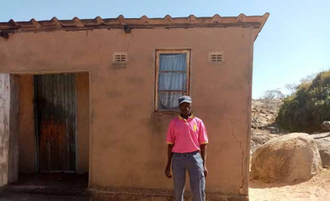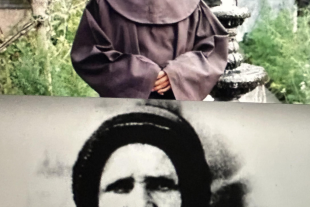Eyewitness: Mining in Zimbabwe

Sekuru stands outside his house which has been cracked since 2014. The house lets in rain but he has received no compensation - Photo Trócaire
Houses are cracking, rubble and waste is being dumped in the river and women are forced to walk longer distances for clean water - all for the extraction of granite. Yet the communities are not seeing the benefits of this lucrative business.
Across the world Trócaire partners are resisting land grabs, dispossessions, land degradation and environmental damage caused by corporations acting in pursuit of profit. I recently visited Zimbabwe and met with Josephine Chiname of Zimbabwe Environmental Law Association. Josephine brought me to see the impact of mining in the town of Mutoko, a mountainous region in the north-eastern part of Zimbabwe that has attracted companies in search of valuable black granite stone for export. Companies mainly from China and Italy operate in the area with little accountability to the surrounding farming community.
The major human rights issues arising are that of land and displacement explains Josephine. "Companies come to mine and exploit the land but the communities are not always aware of their rights. People have been relocated from their homes without being fully compensated." The land is left with discarded rock and rubble, some has been dumped on farming plots and in the dried up river. Some companies take what they can and leave without cleaning up.
As we enter Mutoko we are greeted by Loice Guvheya, a community monitor, part of ZELA's community monitoring programme in the region. ZELA has trained community members to monitor the human rights issues and to help community members to address the negative impact of mining in the area. Loice is passionate about her work. "I am emotive about the damage that is being done to our environment. We thought the mining would eradicate poverty and our life would be upgraded but nothing changed."
We travel several miles along an unpaved road to Vumbiga village. I notice the major crevices in the dusty dry ground. These are the gullies explains Loice, these deep fissures in the ground have been caused by mining companies who then left after the granite was extracted. Loice explains how these are a danger to children and animals - this is a safety issue in an area with unpaved roads and without electricity. She also explains that this means women have to take alternative and longer routes to fetch water for the family.
We get out of the car and are greeted by Evelyn, a paralegal, also trained by ZELA and a colleague of Loice. They bring us to visit the house of Sekuru Makope. He is visibly upset when he shows us the deep cracks in the walls of his house. These were caused by a block of granite which fell off a truck right outside his house; the company truck used a through road that went right through his property. The damage caused in 2014 still has not been fixed and when it rains water leaks through the cracks in the walls.
Damage to houses is a common occurrence and community members believe the blasting of the mines with explosives is the cause of this. This is being denied by the companies and those who have damaged houses have received no compensation.
"Companies are also getting mining licenses and permits without any consultation with the community," says Josephine. "Communities must be involved in decisions affecting their lives and must give consent for mining to take place on their land. This is particularly important for women who are excluded from the limited consultation between companies and community members."
In order to make sure that corporations respect human rights in their activities, Trócaire is asking the Irish government to support a binding UN treaty to regulate the activities of transnational corporations. At present there is no international legal framework to ensure corporations don't violate human rights. We need this Treaty so that companies will have to put human rights before profit and respect communities. Communities should be involved in decisions affecting them and women's voices need to be central to these decisions. This is why this Treaty is so important.
The Treaty will be negotiated in Geneva in October and it is crucial that Ireland stands on the side of communities. If you would like to help make this a reality please sign this petition: www.trocaire.org/getinvolved/makingakilling
Read more about Trocaire here: www.trocaire.org/


















